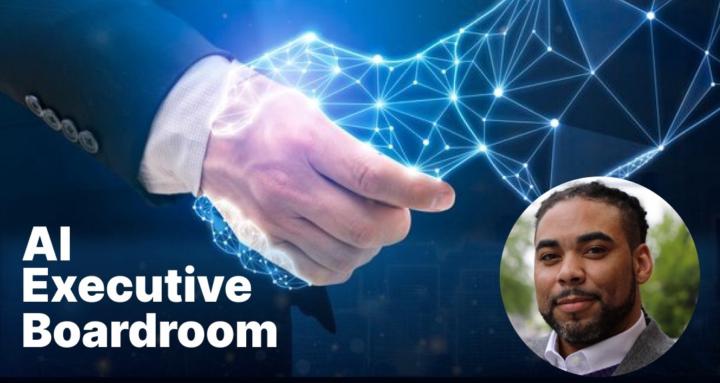Pinned
🚀 Welcome to the AI-Driven CEO Network! 👋
Here’s how to get started: ✅ Head to the General Forum (Start Here) and introduce yourself — share where you’re based, your company focus, and one goal you’re working toward with AI. ✅ Explore AI & Future of Work Insights to discover bold ideas and strategies. ✅ Check out Tools, Tech & Resources for frameworks that drive efficiency and results. ✅ Join Events & Networking to connect with peers globally. ✅ Share your milestones in Recognition & Wins so we can celebrate your progress together. This network thrives on collaboration, so don’t be shy — your insights could be the spark another leader needs. Welcome aboard. Together, let’s design the next era of business: AI-first, profitable, and efficient.
Pinned
Exactly What Is An AI-First Company?
You’ve heard of digital-first. You’ve heard of tech-enabled. But AI-first? That’s a whole new level. It’s not a trend. It’s a mindset. An AI-first approach organizes people, processes, and decisions around the capabilities of artificial intelligence. Companies that master it aren’t just faster—they’re smarter, more efficient, and more profitable. AI at the Core Most companies today are “AI-curious.” They run pilots, test chatbots, or issue executive memos about experimentation. The problem? These efforts are usually patched onto old ways of working. An AI-first company flips that script. AI isn’t an add-on. It’s the central nervous system. Decisions, workflows, and team structures all revolve around it. AI doesn’t just automate—it analyzes, recommends, executes, and amplifies human judgment. For your team, that means moving from doing tasks to making the calls that matter. Humans become collaborators, strategists, and sense-makers—steering the AI engine, making judgment calls, and taking action where only humans can. The future isn’t digital-first. It’s AI-first. And the companies that embrace it are the ones that will define the next era of growth. ______ If AI could take over routine decision making in your organization tomorrow, how would your role and the roles of your leadership team change? What human strengths would become most critical in an AI first world
1
0

CEO AI coffee chat is LIVE
Hi folks, Im live answering folks questions about generative and agentive AI right now for the next hour. IF you have questions about how to improve your profitability of you business with AI feel free to hop into the conversation.
1
0
GPT-5 Pro: Too Smart to Use, or the Smartest Move for Your Business?
When OpenAI released GPT-5 Pro, the reaction was a mix of awe and frustration. Awe, because the model demonstrates reasoning, precision, and adaptability beyond anything we’ve seen before. Frustration, because its very sophistication makes it paradoxically harder to harness. That’s the paradox behind the video “The $200 AI That’s Too Smart to Use (GPT-5 Pro Paradox Explained)”—GPT-5 Pro is provably smarter, yet often experientially worse if businesses don’t know how to work with it. So, how can leaders cut through the paradox and actually make GPT-5 Pro work for their teams, customers, and bottom line? 🟢Why GPT-5 Pro Feels “Too Smart to Use” The problem isn’t that GPT-5 Pro underdelivers. It’s that it’s so advanced it requires a new playbook. - Complex model orchestration: GPT-5 Pro dynamically routes prompts between reasoning models. That gives you more power, but adds unpredictability. - Longer context, deeper reasoning: With a 256K-token context window, GPT-5 can read books, parse enterprise data, or run simulations—but vague prompts collapse under the weight of its reasoning. - Agentic workflows: It can plan and execute multi-step tasks autonomously, but only if you’re crystal clear on scope and guardrails. - Sophisticated safety and steering: Fewer hallucinations, more reasoning transparency—yet it forces you to think harder about trust, oversight, and integration. Put simply: the smarter the AI, the smarter your approach needs to be. 🟢 Where GPT-5 Pro Delivers Real Business Value Businesses that see real ROI with GPT-5 Pro aren’t just “using” it. They’re partnering with it. - Customer Support & Personalization - Software Development - Knowledge Management - Decision Support 🟢 How to Harness the Paradox Here’s the executive playbook for cutting through the “too smart to use” problem: 1. Start with a narrow, high-impact use case 2. Invest in prompt literacy 3. Integrate, don’t just upgrade 4. Build internal trust with transparency 5. Continuously refine
1
0
How AI agents can eliminate waste in your business - and why that's smarter than cutting costs
In today’s AI-powered economy, business leaders are under pressure to deliver more value with fewer resources. AI agents are at the forefront of this transformation, helping companies identify and eliminate waste while enhancing workforce productivity and operational efficiency. Why Cost-Cutting Alone Isn’t Enough In challenging market conditions, executives often default to cutting costs. But cost-cutting is a silo-based strategy—focused on managing resources rather than creating value. The smarter approach? Waste reduction. By removing inefficiencies and redirecting resources to high-value work, companies accelerate growth without sacrificing performance. Gartner highlights the urgency: CEOs must adopt AI agents—or risk falling behind. Yet, hype exists alongside opportunity. Removing silos without a clear strategy can create a “spill” of wasted resources. The most effective organizations are boundless, creating flows of resources where they’re needed most. AI Agents as Strategic Accelerators CFOs and business leaders are increasingly prioritizing AI agents: - 25% of AI budgets are devoted to agentic AI. - 64% of CFOs report AI is influencing business spending. - 74% expect AI agents to drive revenue, not just reduce costs. - 72% believe AI agents will transform their business model. These figures illustrate the dual impact of AI: cost efficiency and strategic value creation. AI agents aren’t just replacing routine work—they’re freeing human talent to focus on high-impact, revenue-generating tasks. Defining Waste in Modern Business Waste occurs when resources are overused, misused, or underutilized: - Overuse: Using human resources for tasks AI could handle more efficiently. - Misuse: Deploying resources in low-value roles or redundant processes. - Underuse: Failing to maximize employees’ unique human skills. From the employee perspective, assigning repetitive work to humans is a lost opportunity for growth. From the customer perspective, misallocated resources reduce satisfaction and impact outcomes.
0
0

1-21 of 21

skool.com/the-future-ready-ceo-network
The AI Executive Boardroom is where trailblazing CEOs and leaders reimagine their organizations, making them more profitable, resilient, and AI-first
Powered by

